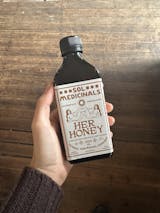Everything you need to know
Ingredients
how to use
need to know
Pregnancy & Lactation
TASTE
storage
Delivery & Returns
◦ How long does delivery take?
Orders are packed within 1–3 business days. Once dispatched, shipping times are:
- Standard: 3–8 business days
- Express: 1–3 business days
◦ Can I return a product?
Yes — we accept returns for unopened items within 14 days of delivery. Just email us at hello@solmedicinals.com before sending anything back.
◦ What if my item arrives damaged?
We're so sorry to hear that. Please send a photo of the item within 48 hours of delivery to hello@solmedicinals.com, and we’ll arrange a replacement or refund right away.
Evidence-Based References






